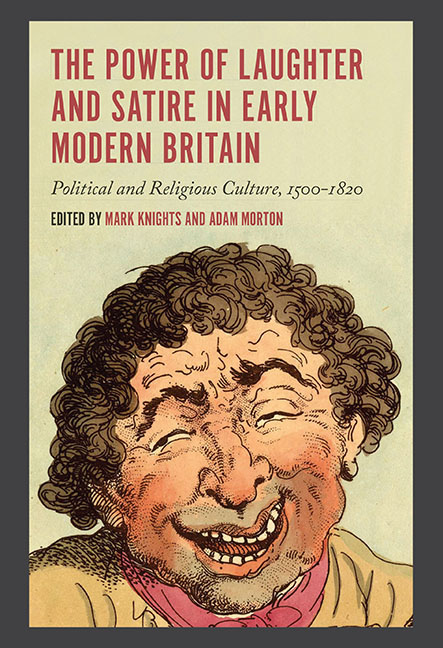Book contents
- Frontmatter
- Contents
- List of Illustrations
- List of Contributors
- Acknowledgements
- List of Abbreviations
- Introduction: Laughter and Satire in Early Modern Britain 1500–1800
- 1 Dissolving into Laughter: Anti-Monastic Satire in the Reign of Henry VIII
- 2 Mocking or Mirthful? Laughter in Early Modern Dialogue
- 3 Farting in the House of Commons: Popular Humour and Political Discourse in Early Modern England
- 4 Continuing Civil War by Other Means: Loyalist Mockery of the Interregnum Church
- 5 Laughter as a Polemical Act in Late Seventeenth-Century England
- 6 Spectacular Opposition: Suppression, Deflection and the Performance of Contempt in John Gay's Beggar's Opera and Polly
- 7 ‘Laughing a Folly out of Countenance’: Laughter and the Limits of Reform in Eighteenth-Century Satire
- 8 Nervous Laughter and the Invasion of Britain 1797–1805
- 9 ‘Was a laugh treason?’ Corruption, Satire, Parody and the Press in Early Modern Britain
- Bibliography
- Index
9 - ‘Was a laugh treason?’ Corruption, Satire, Parody and the Press in Early Modern Britain
Published online by Cambridge University Press: 01 September 2018
- Frontmatter
- Contents
- List of Illustrations
- List of Contributors
- Acknowledgements
- List of Abbreviations
- Introduction: Laughter and Satire in Early Modern Britain 1500–1800
- 1 Dissolving into Laughter: Anti-Monastic Satire in the Reign of Henry VIII
- 2 Mocking or Mirthful? Laughter in Early Modern Dialogue
- 3 Farting in the House of Commons: Popular Humour and Political Discourse in Early Modern England
- 4 Continuing Civil War by Other Means: Loyalist Mockery of the Interregnum Church
- 5 Laughter as a Polemical Act in Late Seventeenth-Century England
- 6 Spectacular Opposition: Suppression, Deflection and the Performance of Contempt in John Gay's Beggar's Opera and Polly
- 7 ‘Laughing a Folly out of Countenance’: Laughter and the Limits of Reform in Eighteenth-Century Satire
- 8 Nervous Laughter and the Invasion of Britain 1797–1805
- 9 ‘Was a laugh treason?’ Corruption, Satire, Parody and the Press in Early Modern Britain
- Bibliography
- Index
Summary
In December 1817 the radical publisher William Hone was tried three times, on three consecutive days, because he had parodied the church's prayers to make political points about the corruption of Parliament and the state. One of the publications for which he was prosecuted, The Sinecurist's Creed, parodied the Athanasian Creed in order to attack those who had been given a well-paid job in return for political loyalty to the government:
WHOSOEVER will be a Sinecurist: before all things it is necessary that he hold a place of profit.
Which place except every Sinecurist do receive the salary for, and do no service: without doubt it is no Sinecure.
And a Sinecurist's duty is this: that he divide with the Ministry, and be with the Ministry in a Majority.
Another of the offending pamphlets, The Late John Wilkes's Catechism, parodied a religious catechism to offer instructions ‘to be learned of every Person before he be brought to be confirmed a Placeman or Pensioner by the Minister’. Its central character, Lickspittle, is taught to become ‘the Child of Corruption, and a Locust to devour the good Things of this Kingdom’ by doing the ministry's every bidding. It offered ‘ten commandments’, which included the injunctions ‘Thou shalt not take the Pension of thy Lord the Minister in vain’ and ‘Thou shalt not say, that to rob the Public is to steal’. The catechism also included a parody of the Lord's Prayer:
OUR Lord who art in Treasury, whatsoever be thy name, thy power be prolonged, thy will be done throughout the empire, as it is in each session. Give us our usual sops, and forgive us our occasional absences on divisions; as we promise not to forgive them that divide against thee. Turn us not out of our Places; but keep us in the House of Commons, the land of Pensions and Plenty; and deliver us from the People. Amen.
A third offending publication, The Political Litany, similarly used a parody of conventional religious responses in order to attack corruption.
- Type
- Chapter
- Information
- The Power of Laughter and Satire in Early Modern BritainPolitical and Religious Culture, 1500-1820, pp. 190 - 210Publisher: Boydell & BrewerPrint publication year: 2017
- 1
- Cited by

